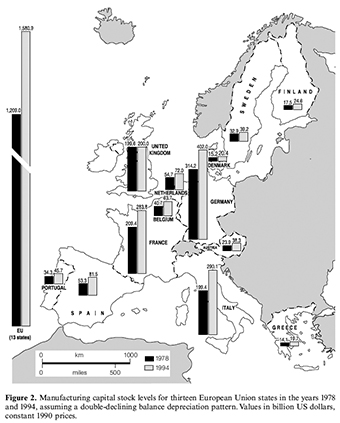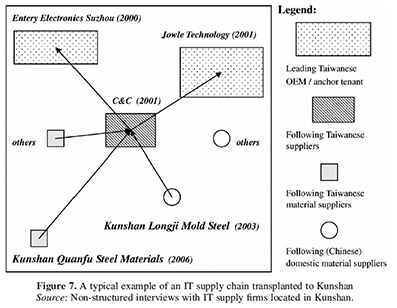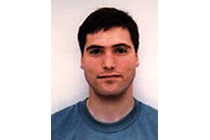Profile
I am an economic geographer specialising in the study of the determinants of regional economic growth, the investigation of the evolution of spatial disparities and the formulation of policies for the reduction of geographic inequalities. My most recent research focuses on the role of foreign direct investment in promoting economic development in lagging regions and the territorial effects of the knowledge economy, especially investments in intangibles. Theoretical considerations about the nature of the economic indicators applied in spatial analysis and the construction of new indicators form an important aspect of this work. Regions in Great Britain, the European Union, China and the OECD countries have provided the empirical context for my research.
Key publications
- Melachroinos, K.A. and Spence, N. (2019) The spatial footprint of the knowledge economy: The role of intangible investment in shaping regional inequalities in Great Britain, Tijdschrift voor Economische en Sociale Geografie, Vol. 110 (4): 442 – 471
- Melachroinos, K.A. and Spence, N. (2014) The impact of intangible assets on regional productivity disparities in Great Britain, Environment and Planning A, Vol. 46 (3): 629 – 648
- Melachroinos, K.A. and Spence, N. (2013) Intangible investment and regional productivity in Great Britain, Regional Studies, Vol. 47 (7): 1048–1064
- Melachroinos, K.A. and Spence, N. (2013) The territorial impact of the knowledge economy: Intangibles and regional inequality in Great Britain, European Planning Studies, Vol. 21 (10): 1491-1508
- Chen, C.M., Melachroinos, K. and Chang, K.T. (2010) FDI and local economic development: The case of Taiwanese investment in Kunshan, European Planning Studies, Vol. 18 (2): 213–238
Key achievements/awards
- 2001–2003 Special Research Fellowship from the Leverhulme Trust
Teaching
I am the convenor of the undergraduate modules GEG4004 Research Methods for Geographers and Environmental Scientists and GEG5144 Geographical Information Systems.
The first module module introduces geography and environmental science students to key quantitative and qualitative research methods and GIS. These include mapping, spatial analysis, interviewing, questionnaire design, survey methods, and descriptive and inferential statistics. Lectures are combined with regular computer lab-based practical sessions in order to understand the theories behind different methods and learn how they can be applied in geographical and environmental research. As part of this practical element, students will receive training in the use of MS Excel, IBM SPSS Statistics and ArcGIS to manipulate and analyse data.
The second module focuses on the key principles of GIS analysis and their application in modelling geographical realities. It is practically based and a requirement of the module is to become proficient in the operation and use of the GIS software - ArcGIS. The main components of the module include data input, vector and raster data analysis, data quality and management of GIS errors, geostatistical analysis, planning and managing GIS projects.
In addition, I teach the GIS sessions of the postgraduate module GEG7120 Geographical Thought and Practice.
Research
Research Interests:

2001–2003 Special Research Fellowship from the Leverhulme Trust to work on the project: ‘Productivity Disparities across the European Union’.
The main aim of this project was to examine the impact of the European integration process on the evolution of spatial inequalities. The eradication of internal borders placed European regions under tremendous pressure to enhance their competitiveness. This research attempted to investigate four issues arisen in relation to the dynamics of change. The first issue concerned whether a convergence process was under way or the gap between advanced and lagging economies became wider. The second issue related to the sources behind the productivity differences and in particular to the impact of variables, such as industrial restructuring, fixed capital accumulation and R&D expenditure on the evolution of productivity. The third issue regarded the perspectives that these indicators provided about the nature of geographic inequalities in contemporary Europe. Finally, the fourth issue concerned the policy lessons that could be drawn from the productivity analysis for the formulation of appropriate policies for the alleviation of spatial disparities.
2007–2010 Grant NSC 96-2415-H-424-004-MY3 from the National Science Council of Taiwan (budget NT$2,532,000) to support research on the project ‘Can a Science Park be made by FDIs? The case of Kunshan and Taiwanese Investment’ (with Kang-Tsung Chang and Ching-Mu Chen).

This research project investigated the driving forces of the dramatic transformation of Kunshan, a small city near Shanghai in China, from an agricultural area to a global node of the information technology (IT) industry within a period of just 25 years. Contrary to conventional wisdom Kunshan managed to gradually emerge as new type of cross-border IT centre through an innovative local foreign direct investment (FDI) policy, inflows of Taiwanese investments and integration into the Taiwanese science parks’ networks. In addition, the project considered the future of Kunshan’s economy and drew some potentially valuable policy lessons for lagging regions in other parts of the world that aspire to embark on FDI-driven development strategies.
Publications
A full list of publications is available at PubLists
Selected recent publications
- Melachroinos, K.A. and Spence, N. (2019) The spatial footprint of the knowledge economy: The role of intangible investment in shaping regional inequalities in Great Britain, Tijdschrift voor Economische en Sociale Geografie, Vol. 110 (4): 442 – 471
- Melachroinos, K.A. and Spence, N. (2014) The impact of intangible assets on regional productivity disparities in Great Britain, Environment and Planning A, Vol. 46 (3): 629 – 648
- Melachroinos, K.A. and Spence, N. (2013) Intangible investment and regional productivity in Great Britain, Regional Studies, Vol. 47 (7): 1048–1064
Supervision
I welcome enquiries from prospective students for PhD research in the following areas: regional economic development, economic growth, spatial disparities, intangible investment, knowledge economies, foreign direct investment, territorial competition, regional policy and planning
PhD students
- 15/2/2008 - 15/9/2008 Ching-mu Chen “Two Essays on Footloose Capital, Mobile Labour and Economic Geography”, Visiting PhD student from National Taiwan University
Public Engagement
2003–2005 Secondment to the Territorial Statistics and Indicators Unit, Organisation for Economic Co-operation and Development (OECD) to contribute to the development of the OECD Territorial Database. This major project aspired to identify factors of regional growth and untapped local potentials with the view to informing decisions on the implementation of territorial competitiveness-enhancing policies. The spatial coverage of the project was extensive comprising of around 2300 regions from 30 countries spanning over four continents.
Selected contributions to OECD reports and studies
- OECD (2006) OECD Territorial Reviews: France, OECD, Paris, ISBN 9264022651
- OECD (2005) OECD Regions at a Glance, OECD, Paris, ISBN 9264018638


